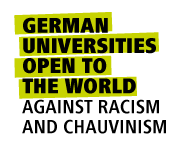
Newsarchiv: Creating knowledge since 1502
Jahr 2021
Medizin, Ethik und Recht während der Corona-Pandemie: Tagung an der Uni Halle
Wer bekommt welchen Corona-Impfstoff – und wann? Wie lässt sich fair entscheiden, welche Patienten behandelt werden, wenn die Ressourcen nicht reichen? Wie lässt sich Arbeit familienfreundlich organisieren? Diesen Fragen widmet sich eine Tagung, die am 18. und 19. Februar digital an der Uni Halle stattfindet. Organisiert wird sie vom Zentrum Medizin – Ethik – Recht der MLU mit dem Ministerium für Justiz und Gleichstellung in Sachsen-Anhalt. Auch Justizministerin Anne-Marie Keding nimmt an der Tagung teil.
Tiny 3D structures enhance solar cell efficiency
A new method for constructing special solar cells could significantly increase their efficiency. Not only are the cells made up of thin layers, they also consist of specifically arranged nanoblocks. This has been shown in a new study by an international research team led by the Martin Luther University Halle-Wittenberg (MLU), which was published in the scientific journal "Nano Letters".
Stoffwechsel: Forscher klären erstmals Struktur von riesigem Enzymkomplex auf
Mit einer neuen Methode lässt sich die Struktur besonders großer und komplexer Enzyme in ihrer natürlichen Form aufklären. Das zeigen Wissenschaftlerinnen und Wissenschaftler der Universität Halle und der Technischen Universität Berlin in einer neuen Studie in der Fachzeitschrift "Cell Reports". Sie haben einen Multienzymkomplex untersucht, der für den Stoffwechsel eine essenzielle Rolle spielt und dabei auch entdeckt, dass dieser anders funktioniert als bisher gedacht. Dieses hilft, bestimmte Erkrankungen besser zu verstehen.
Researchers develop a new approach to detect pancreatic cancer
A protein found commonly in human blood might help with the detection of hard-to-diagnose pancreatic tumours. Researchers at Martin Luther University Halle-Wittenberg (MLU), the Alfried Krupp Hospital in Essen and the University of Witten/Herdecke have developed approach using the protein`s structure and its function as a proxy for this. In a first study in "ACS Pharmacology & Translational Science", the team shows how its method can also be used to differentiate between benign and malignant tumours.
Forscher der Uni Halle stellen gefragte Nanopartikel her und klären erstmals ihre Struktur auf
Winzige Nanopartikel lassen sich mit Farbstoffen ausstatten und könnten für neue bildgebende Verfahren genutzt werden. Hergestellt haben diese Chemiker und Physiker der Universität Halle. Die Forscher haben auch erstmals die besondere Struktur der Partikel vollständig aufgeklärt. Die Ergebnisse wurden in der Fachzeitschrift "Angewandte Chemie" veröffentlicht.
"Science": Soil biodiversity should be a part of conservation efforts
A quarter of all known species live in the soil. Life above ground depends on the soil and its countless inhabitants. Yet, global strategies to protect biodiversity have so far paid little attention to this habitat. In the journal "Science", an international team of researchers led by the German Centre for Integrative Biodiversity Research (iDiv), the Martin Luther University Halle-Wittenberg (MLU), Leipzig University (UL) and Colorado State University calls for greater consideration of soils in the renegotiation of international biodiversity strategies. Their relevance must be recognised far beyond agriculture.
Bildung der Eltern beeinflusst langfristig die Gesundheit ihrer Kinder
Die Bildung der Eltern hat nicht nur Einfluss auf Bildung, Beruf und Einkommen ihrer Kinder. Sie wirkt auch auf deren Gesundheit – und das bis ins hohe Alter, Jahrzehnte nachdem die Kinder das Elternhaus verlassen haben. Das zeigt eine neue Studie von zwei Forschenden der Universität Halle, die im renommierten Fachjournal "European Sociological Review" erschienen ist. Hierfür untersuchten sie die Angaben von mehr als 15.000 Westdeutschen im Alter von 18 bis 80 Jahren. Für die Forschenden unterstreicht dieser Befund den familiären Einfluss auf Bildungswege und die daraus resultierende gesundheitliche Ungleichheit in der Bevölkerung.
Winzige 3D-Strukturen machen Solarzellen effizienter
Eine neue Bauweise für spezielle Solarzellen könnte deren Effizienz deutlich steigern. Dafür dürfen die Zellen nicht nur aus dünnen Schichten, sondern aus gezielt arrangierten Nanoblöcken bestehen. Das zeigt eine neue Studie eines internationalen Forschungsteams unter Leitung der Universität Halle, die im Fachjournal "Nano Letters" veröffentlicht wurde.
Neuer Gesetzentwurf zur Sterbehilfe: Für mehr Selbstbestimmung am Lebensende
Die Sterbehilfe muss in Deutschland gesetzlich neu geregelt werden. Juristinnen und Juristen der Universität Halle, der Ludwig-Maximilians-Universität München (LMU) und der Universität Augsburg haben hierfür einen neuen Gesetzentwurf erarbeitet. Darin liefern sie Vorschläge für eine stärkere Selbstbestimmung am Lebensende und weitere Regelungen für die Sterbehilfe. Das Bundeverfassungsgericht hatte im Februar 2020 das geltende Gesetz zum Verbot der Sterbehilfe für verfassungswidrig erklärt, weshalb die Neuregelung nötig geworden war.
Evolution in a test tube: these bacteria survive on deadly copper surfaces
The descendants of regular wild-type bacteria can evolve to survive for a long time on metallic copper surfaces that would usually kill them within a few minutes. An international research team led by Martin Luther University Halle-Wittenberg (MLU) and the Bundeswehr Institute of Microbiology was able to produce these tiny survivalists in the lab and has been able to study them more closely. The team reports on its findings in "Applied and Environmental Microbiology".
Begehrte Stipendien: MLU-Forscherin Christine Fürst lädt als Humboldt-Scout internationale Talente nach Halle ein
Die Landschaftsökologin Prof. Dr. Christine Fürst ist in das neue Henriette Herz-Scouting-Programm der Alexander von Humboldt-Stiftung aufgenommen worden. In den kommenden Jahren hat sie damit die Möglichkeit, drei eigens ausgewählte Nachwuchswissenschaftlerinnen und -wissenschaftler mit einem Forschungsstipendium der Humboldt-Stiftung an die Universität Halle einzuladen. Normalerweise müssen die Stipendien von den Forschenden selbst beantragt werden. In der ersten Runde des Programms wurden insgesamt 33 Wissenschaftlerinnen und Wissenschaftler von 26 Hochschulen in Deutschland zu "Humboldt-Scouts" ernannt.
Researchers develop new combined process for 3D printing
Chemists at Martin Luther University Halle-Wittenberg (MLU) have developed a way to integrate liquids directly into materials during the 3D printing process. This allows, for example, active medical agents to be incorporated into pharmaceutical products or luminous liquids to be integrated into materials, which allow monitoring of damage. The study was published in "Advanced Materials Technologies".






